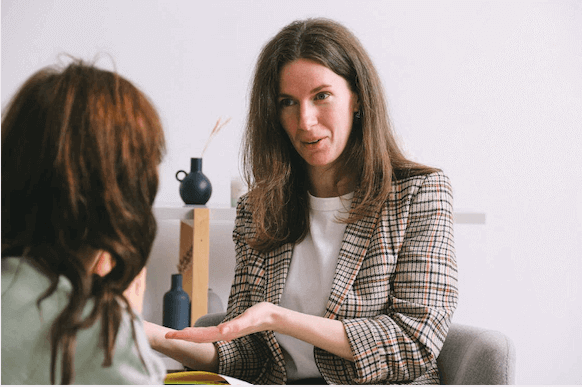Anxiety
What Is Anxiety?
Anxiety is an overwhelming feeling of unease, dread, nervousness, worry or fear. It is the body’s way of responding to potential danger and can become problematic if it happens on a regular basis and makes it difficult to participate in everyday activities.
Anxiety symptoms include feeling on edge, having shortness of breath, struggling to concentrate, feeling irritable, getting pins and needles, feeling drowsy and being easily distracted. As well as this, it is not uncommon to get heart burn, stomach aches, nausea, headaches or to face difficulty sleepy.
What Are Some Different Types Of Anxiety Disorders?
Our team of Psychologists and Psychotherapists are trained to assist with a variety of anxiety disorders. Examples include but are not limited to:
General Anxiety And Worry
Generalised anxiety disorder involves facing exaggerated worry and fear during normal everyday situations. There may be little or no valid cause to feel anxious but you could be faced with overwhelming worry that is preventing you from living your life to the full.
Panic And Phobias
Panic involves an unpredictable sensation of intense worry and fear, and often includes physical symptoms such as shortness of breath and chest pains. Phobias are an irrational and overwhelming fear of something that is unlikely to be dangerous.
Obsessive-Compulsive
Obsessive Compulsive Disorder (OCD) involves recurring unwanted thoughts that are obsessions. It leads to repetitive behaviours that you cannot control, which you feel compelled to perform repeatedly to provide temporary relief.
Health Anxiety
Health anxiety disorder is characterised by excessive worry and fear about having a serious medical condition. Individuals with health anxiety often misinterpret normal bodily sensations as signs of severe illnesses, leading to heightened anxiety and a persistent preoccupation with their health.
Work Related Stress
Work related stress anxiety leaves individuals experiencing overwhelming feelings of stress, worry and fear specifically related to their job or workplace environment. This can manifest as constant apprehension about work tasks, fear of failure or an inability to cope with work pressures, impacting job performance.
Social Anxiety
Social anxiety disorder involves an intense fear of social situations, often stemming from a fear of judgement, embarrassment or scrutiny by others. Individuals with social anxiety may avoid social interactions and feel stressed at the thought of having to socialise.
Therapy For Anxiety in 3 Steps
Step 1: Assessment And Understanding
The first step in therapy for anxiety involves a thorough assessment by one of our team. Through open and empathetic conversations, we will aim to understand the individual’s specific anxiety triggers, thought patterns and behavioural responses. This process helps to identify the root causes of anxiety and tailor the therapeutic approach accordingly.
Step 2: Learn How To Deal With Anxiety
Our therapist will provide support and guidance, with effective coping mechanisms for anxiety. Therapy techniques include Cognitive Behavioural Therapy to help individuals learn to reframe negative thinking, and Exposure Therapy to help those facing anxiety to confront and manage their feelings in a controlled manner.
Step 3: Anxiety Treatment And Plan
The therapist will end the session by asking the individual if they have any questions or thoughts they wish to add. Depending on how they are feeling, they may develop a collaborative treatment plan and arrange additional sessions, creating a structured roadmap for addressing and reducing the client’s anxiety.
Where Can I See An Anxiety Therapist Near Me?
We offer treatment for anxiety in our clinics in London in Finchley (N3 2JU), Brixton/Clapham (SW2 5UL) or Hackney (E2 9FN). Home visits are available on request.
If you live further afield, our anxiety therapists can offer you sessions over the phone or online via zoom which means that we can provide counselling to those based across the UK. Locations include but are not limited to Aberdeen, Bath, Belfast, Bradford, Cambridge, Chester, Derby, Durham, Exeter, Lancaster, Leeds, Manchester, Nottingham, Norwich, Southend-on-Sea and York.
Can The Oak Tree Practice Help Me Learn How To Manage Anxiety?
At The Oak Tree Practice, our team of 37 therapists are highly qualified and can help you to understand your anxiety. With a wealth of experience, we are trained to show you how to overcome social anxiety, OCD, fear, phobias and more. We offer tools to help you to reduce panic and manage stressful situations calmly.
Whether you need CBT techniques for anxiety, breathing techniques, mindfulness exercises for anxiety or other treatment, our experts will tailor their approach to suit your individual needs. So what are you waiting for? Enquire via our contact form, Whatsapp us on 07926 713 198 or call us on

Client Testimonials For Issues We Have Helped With
Frequently Asked Questions About Anxiety
What Are Key Signs Of Anxiety?
Key signs of anxiety include frequently feeling anxious and uneasy, having racing thoughts, difficulty thinking straight, struggling to relax and often thinking of the worst-case scenarios. You may also have a feeling of dread in the pit of your stomach, face panic attacks or struggle to sleep because you are unable to relax your mind.
What Causes Anxiety?
Anxiety can be caused by a combination of genetic, environmental and neurological factors. Life stressors, trauma, a family history of anxiety disorders, grief, relationship difficulties, physical health problems and imbalances in brain chemistry are common contributors to the development of anxiety.
Do You Offer Treatment For Anxiety In Children?
Yes, our sister practice the Little Bee Clinic offers therapy for children facing anxiety. The practice specialises in helping and supporting children and young adults, with experienced therapists who can offer appropriate treatment such as Play Therapy or Cognitive Behavioural Therapy.
Why Do I Have Anxiety For No Reason?
Experiencing anxiety with no specific reason can be influenced by a variety of factors, including an overactive stress response, genetic predispositions or unresolved emotional issues. In some cases, generalised anxiety may manifest without an apparent trigger, and seeking support from mental health professionals can help explore underlying causes and develop coping strategies.
Does Anxiety Go Away?
Yes, anxiety can be effectively managed and reduced with appropriate treatment, which may include therapy, medication and lifestyle changes. While the complete elimination of anxiety is not always possible for everyone, learning coping mechanisms and developing resilience can significantly diminish the impact of anxiety and improve overall well-being.
Will My Therapy Session Be Covered By Insurance?
Most of our anxiety therapists are covered by insurance. Examples include AXA, Vitality Health, BUPA, WPA, Cigna and Simply Health. We recommend double checking with your therapist if they are insured before you have your first session.
